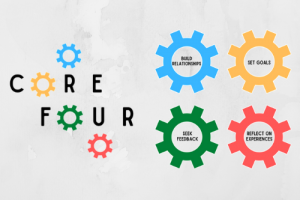The Core Four Skills to Build a Life of Intention
By Allison McWilliams (’95), Ph.D., Assistant VP, Mentoring and Alumni Personal & Career Development, Wake Forest University
In January 2021 we celebrate National Mentoring Month, as we do each year, to recognize and honor those fabulous mentors and mentees across our community who show up for and with one another and commit to developing relationships and communities of care. This year, our theme for National Mentoring Month is One, both to recognize this year of 2021, and also to acknowledge that sometimes, all it takes is one: one person who sees and cares about you, one question to start the conversation, one step to build a relationship, one goal to move forward with intention. These are great reminders for each of us, in our busy, over-scheduled lives. What might happen if you stopped trying to do all the things, and started trying to do just one?
We also have created a set of skills that are critical to building effective mentoring relationships, and to building a life and a career of intention. We call these the Core Four. Our goal is for every Wake Forest student to be able to use these four skills by the time they graduate. But whether you are still a student or if those days are far in the rear-view mirror, these are skills we all need to develop. And the good news is, you can, with some practice.
The first of the Core Four is Build Relationships. Sounds simple enough! And, if you are an adult out in the world you know that building good, strong relationships that align with your values and support your goals can be a challenge. It takes time, something that you don’t have in great supply, anymore, to build relationships. It takes work to build relationships. Sometimes it can take proximity: finding the people you like who align with your interests. And, it takes some honest self-reflection on who you are and what you’re looking for. Relationships, good, quality relationships, are key to functioning as adults out in the world. So do that self-assessment. Build in time to do the work to seek out relationships of value and intention. It matters, both personally and professionally.
Second, Set Goals. This one may seem to fall more on the professional side of things, and professional goals are important. However, you also need goals for your personal life. Life is an ongoing process of learning and growing. Even if it doesn’t happen within the formal structure of school, and chances are, from here on out, it won’t, you need to continue to progress as a human. Where do you want to be in six months to a year that is different from where you are right now? What do you want your life to look like? How do you want to spend your time, and with whom? These are all great areas for personal goal setting. In addition, goals actually help to develop your brain functioning, give you meaning and purpose, and help with decision-making and setting priorities. Setting goals is like your personal super-power!
Third, Seek Feedback. None of us can be successful in a vacuum. We all need people who can point out our missteps and celebrate our successes; indeed, this is one of the roles great mentors play. But even outside of that, you need to do the work to seek out productive feedback that will help you to grow and make forward progress in your life and work. You have probably heard about the value of Emotional Intelligence, or EQ. Your EQ is what helps you to manage your emotions, your reactions, and your relationships, and it’s critically important to your success. And unlike IQ, it can be developed with intentional practice. One of the best ways to grow your EQ is to seek out feedback from trusted friends and colleagues. Ask for their assessment of your strengths and growth areas. Share your goals with them and ask for their feedback on the steps you are taking. Seeking and responding to feedback appropriately will do wonders for your growth.
Finally, the last Core Four skill area is Reflect on Your Experiences. One of the tragedies of adulthood is that we are simply too busy to ask ourselves these important questions: What just happened?; How do I feel about what just happened?; and, How can I use that knowledge in the future? These questions are the backbone of critical thinking skills, which you used all the time when you were in school. Once we graduate, we stop exercising those muscles, and our days become endless sprints through to-do lists, without ever stopping to ask why (or why not). If you don’t take the time to reflect and identify the lessons learned, then you are doomed to repeat your mistakes over and over again. So build in time – it can just be 15 minutes – each day to ask yourself, what happened, how do I feel about it, and what did I learn?
The Core Four are simple yet profound skills that we all need to build successful lives and careers. The good news is, whether you still are a student or if you are an experienced professional out in the world, whether you are part of a mentoring relationship or not, you can start doing the work to build your Core Four skill sets today. Remember: all it takes is one step forward.
